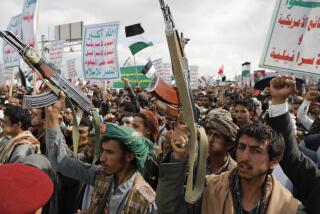Lebanese Terrorist Younis Unrepentant About Hijacking, Says He’d Do It Again
- Share via
WASHINGTON — Dressed in a pink oxford cloth shirt and a blue-and-pink paisley tie, Fawaz Younis appeared ever the polite prisoner.
Smiling, he thanked the federal marshal for pulling out a chair for him. The steel manacles, inserted through the belt loops of his trousers and linked to handcuffs, kept his wrists pulled tightly to his waist. Even simple movements were awkward.
Yet, 24 hours after he had become the first foreign terrorist found guilty of air piracy and hostage-taking under new laws allowing the United States to hunt down suspects overseas, Younis was also unrepentant for the 1985 hijacking of Royal Jordanian Flight 402. If ordered by the militia, he said, he would do it again.
Son of Beirut Policeman
“I’m not a terrorist and my actions were not dependent on any terrorism,” insisted Younis, a former used-car salesman and son of a Beirut policeman. “Our actions did not include harming civilians in any way. Terrorist acts, on the other hand, harm civilians.”
In fact, 70 passengers and crew members were aboard Flight 402, which was hijacked in Beirut and flown to Cyprus, Tunisia and Italy. And some of the hijackers beat the Jordanian military sky marshals, although the jury found that Younis was not involved.
“I had hoped that the United States government would really track down the true terrorists and bring them to justice and make an example of them,” Younis said in an apparent reference to such groups as Hezbollah, the umbrella group whose cells hold most of the nine American hostages in Beirut. “My arrest will not affect terrorist acts one way or the other.”
Now facing a sentence of up to life imprisonment, Younis seemed almost at peace with himself during the first interview since his conviction. Often smiling and occasionally laughing, he was incredulous rather than angry. U.S. authorities, he claims, got the wrong man.
“I have no grudge against the U.S. government,” he said in pointed reference to other Middle East hijackings and terrorist attacks aimed at American targets. “If I had a problem with the American government, I would have harmed the (two) Americans on board. Our problem is with Arabs.”
Younis was ordered to seize the plane and fly it to Tunis, where the Arab League was meeting, to demand that all Palestinians be removed from Lebanon. Shiite militiamen and Palestine Liberation Organization guerrillas returning to Lebanon were, at the time, engaged in fierce battles.
“I am sorry to say that I have been imprisoned because the American government would like to show off,” he said without any trace of bitterness.
As Younis sees it, his problem stems from the lack of understanding in the United States about the context of Lebanese violence. His court-appointed defense lawyer described him as “an ordinary man caught in extraordinary circumstances.”
For much of the interview, Younis reflected candidly on how his life led, almost naturally, to the 1985 hijacking.
Born 30 years ago in the Lebanese city of Baalbeck, famous for ruins of the colossal Temple of Jupiter, which was begun under Julius Caesar and finished by Augustus, Younis’ family moved to the Shiite slums of Beirut when he was still a baby. At the time, tens of thousands migrated to the capital for better jobs.
Younis grew up in the tense environment when both Sunni and Shiite Muslims began mobilizing to demand a greater role in the Christian-dominated government. He was 15 when the Lebanese civil war erupted.
“In 1975, when the war started, we did not quite understand the reasons but we saw the adults carrying guns and walking tall,” he said. “We wanted to be like them, to emulate them.”
Younis completed two years of high school, more than any other family member. In 1979, he joined Amal, the new Shiite political and military faction, as did the majority of his peers. Amal was originally called the Movement of the Oppressed.
“I started to be more aware,” he said. “I was deprived of my rights as a Lebanese citizen. I was oppressed by the government as well as Lebanon’s enemies. That is why I became a soldier, so that I could help those like me who were oppressed and weak. I started to look for a way out of this deprivation.”
The first time he fired a gun, he used it against a local Communist militia. The first weapon he fired was an M-16, the standard U.S. Army automatic rifle. His expressive brown eyes twinkled and he started to laugh as he thought of the irony.
Asked if he had ever killed anyone, he replied: “In war, you just shoot. You don’t see if you kill anyone.” With some indignation, he added: “I’m not a sniper.”
Sometimes he fought in the blocks where he lived. At other times, he operated along the Green Line that divides Muslim-dominated West Beirut from the Christian-led east side of the capital.
Asked when he had last spent a normal day, he said: “The normal day as you see it in America is something that we do not have in our country. The best we can hope for is a day when there is a cease-fire.
“I don’t believe my kids will ever spend a day without being scared and, even if that happens, then they will dream of it.” Younis has two sons, aged 2 and 5, named after his two brothers killed in Beirut clashes, one fighting Christians, the other, Palestinians.
Until 1983, Younis also worked as a used-car dealer to support his family. Asked if he had ever flown before the hijacking, he rattled off the countries he had visited: Germany, Switzerland, Italy, France, Sweden, Poland, Yugoslavia, Bulgaria, Egypt and Saudi Arabia. He said that he visited Poland 19 times. He and his colleagues sometimes drove back from Europe in the used cars they bought.
When Lebanon’s economy began to collapse in 1983, Younis gave up his business. “Once the U.S. dollar became expensive, we could not buy cars any more,” he explained.
When Amal took control of West Beirut in early 1984, he became a full-time Amal military officer, for which he was paid, for a time. His rank was the equivalent of a lieutenant in charge of a platoon of men.
Sixteen months later, he was summoned by Amal’s military commander and ordered to hijack the Jordanian plane.
“My action was legal and legitimate because I am a soldier,” he maintained. “I received an order and I carried it out. It was my duty to fulfill.”
During the trial, Younis painted a grim portrait of what happened when orders were refused. He once saw an Amal member shot through both legs for refusing to fight.
A marshal described Younis’ behavior in prison as “docile, even gentle.” During the trial, he was nicknamed “the teddy-bear terrorist” by members of the gallery because of his demeanor and because the 30-hour hijacking was among the briefest and least bloody acts of Middle East sky piracy.
Since his capture in international waters off Cyprus 18 months ago, Younis has been held in solitary confinement in a New York prison. Its identity has not been disclosed for fear of rescue attempts.
Younis, who has grown back the full beard that he had shaved before his trial, spends most of his time reading the Koran--54 times so far by his count. He had never read it before. Besides the five daily prayers of a devout Muslim, he has said others to make up “for prayers I missed during the war.”
Religion has provided him with comfort, he said. “There is a Koranic verse that says those who fear God, God will make things easy for them,” he said. “Now I believe in Islam on the basis of knowledge, not just because I was born a Muslim.”
The red prayer mark of devout Muslims, who pray with their heads bent over and touching the floor, looks almost permanent on his forehead. He complains about the prison guard who imitates his praying by mumbling nonsense.
Younis was not allowed to call his wife for more than a year after his capture. He has lost 40 pounds, he said with a laugh, because of “the luxury life here.”
He noted that he envied his two dead brothers, whom he called “shahids,” or martyrs.
“Life is nothing, basically, it’s like a cloud passing by,” Younis said. “It’s the afterlife that counts. I’m praying to my God for this.”
More to Read
Sign up for Essential California
The most important California stories and recommendations in your inbox every morning.
You may occasionally receive promotional content from the Los Angeles Times.













